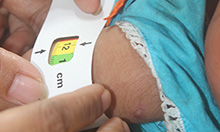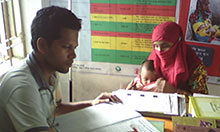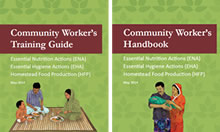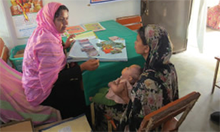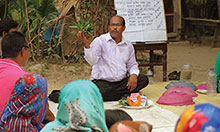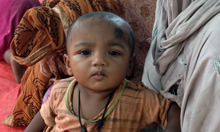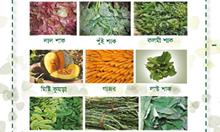Promoting Essential Nutrition Actions (ENA) and Essential Hygiene Actions (EHA) has been a major component of SPRING’s work in Bangladesh. During the first two years of implementation, SPRING/Bangladesh achieved this by training health and agriculture workers on ENA and EHA. These short and practical trainings improved master trainers’ capacity and enhanced frontline health workers’ knowledge and counseling skills to support pregnant and lactating women, and mothers with children under two, to adopt improved nutrition and hygiene practices. The trainings emphasized the delivery of nutrition services with all existing health contacts in upazila (sub-division) health complexes, family welfare centers, community clinics, and during satellite clinics and home visits. SPRING/Bangladesh also provides Ministry of Health and Family Welfare (MOHFW) staff with technical support through joint supportive supervision and home visits to ensure quality program delivery and sustained interaction with beneficiaries to support behavior change.
SPRING/Bangladesh trained Ministry of Agriculture (MOA) Sub-Assistant Agricultural Officers (SAAOs), or agriculture extension officers, on key components of ENA and EHA for households with pregnant and lactating women and mothers with children under two. The training enabled SAAOs to identify opportunities to use their new knowledge and skills and to incorporate them into their routine work. Trained SAAOs have become strong advocates for nutrition, especially to the male farmers in their existing farming groups.
SPRING/Bangladesh has also contracted local NGOs and trains their union facilitators and field supervisors to support Farmer Nutrition School (FNS) groups, peer facilitators, communities and community leaders, and community mobilization for improved nutrition. The local NGO staff work closely with the MOHFW and the MOA staff in scaling up ENA, EHA, and improved food production practices.
Upon request, SPRING/Bangladesh also provides training to USAID-funded partners, which have included the SHIKHA, AESA, NHSDP, AIN and the USAID Horticulture projects. Trainees gained knowledge and skills on how to incorporate key practices on women’s nutrition, exclusive breastfeeding, appropriate complementary feeding, household dietary diversity, and hygiene into their own project activities.
